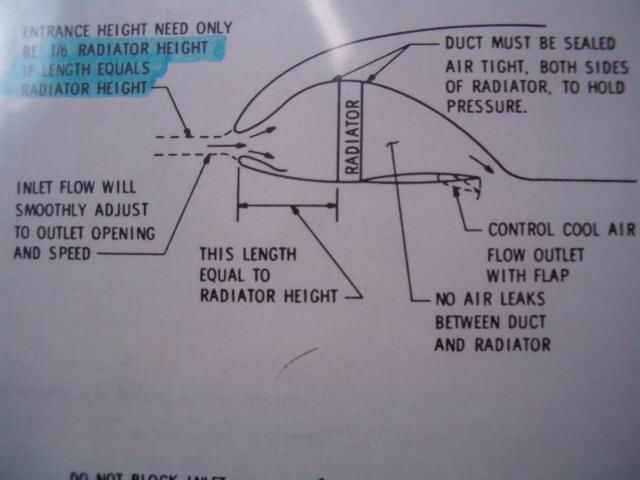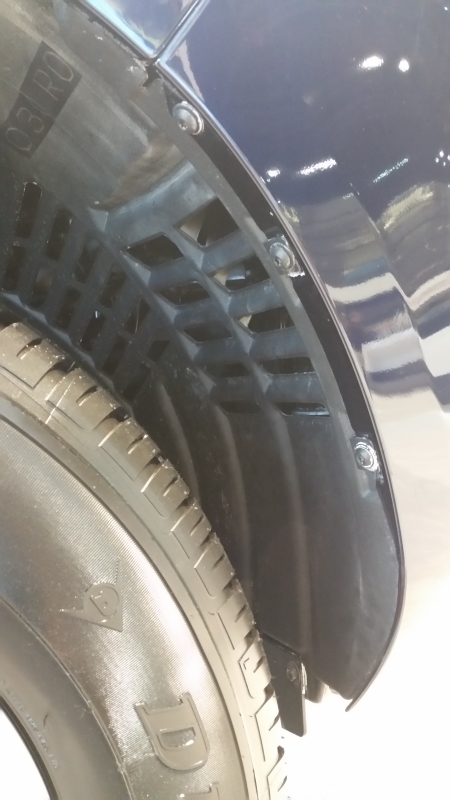 07-03-2019, 11:30 AM
07-03-2019, 11:30 AM
|
#51 (permalink)
|
|
Master EcoModder
Join Date: Jul 2015
Location: Louisiana
Posts: 361
Thanks: 275
Thanked 132 Times in 102 Posts
|
The design of my Jeep's 4.0L straight-six has the fuel rail, intake manifold and exhaust manifold all stacked up together on one side of the engine, and the exhaust downpipes coming off the manifold also have a couple of small cats right below that. So, this design seems to concentrate a lot of heat under the hood which heats it like a griddle. Jeep even issued a corrective measure for some models which involved wrapping some of the injectors and/or fuel rails in insulated foil material to help prevent the fuel boiling, vaporizing and causing hot-start issues.
About using spacers to raise the rear of the hood, it does work, and it works best at slow speeds and when stopped. However, when running at speeds on the highway, I'm told it can be less satisfactory because a high-pressure site develops in the central cowl area due to wind hitting the windshield. The effect of a raised hood in the rear is said to be the engine bay air sometimes can be forced backwards, which some believe can hinder air flow through the radiator. However, I suspect that problem is more theoretical than practical.
About the additional mileage expectations: I wouldn't hold my breath about that. I doubt you'll be able to measure the difference due to hood venting. At least I know I haven't been able to.
__________________

|
|
|

|
|
The Following 2 Users Say Thank You to MeteorGray For This Useful Post:
|
|
 Today Today
|
|
|
|
 Other popular topics in this forum...
Other popular topics in this forum...
|
|
|
|
 07-10-2019, 01:49 PM
07-10-2019, 01:49 PM
|
#52 (permalink)
|
|
Master EcoModder
Join Date: Aug 2018
Location: USA
Posts: 460
Thanks: 188
Thanked 104 Times in 79 Posts
|
I installed my hood vents two days ago. I wasn't able to do A-B testing because it was windy when I finished--my results would not have been accurate. These hood vents do appear to let a lot of heat out, which is good. My mileage does seem to be higher than normal. My morning drive to work is usually 22.5-23.5 mpg. Yesterday I got 23.9 and today I averaged 24.1. I can't conclusively say they've improved mileage at this point, but they definitely aren't harming anything.
|
|
|

|
|
The Following User Says Thank You to Taylor95 For This Useful Post:
|
|
 07-10-2019, 03:23 PM
07-10-2019, 03:23 PM
|
#53 (permalink)
|
|
Master EcoModder
Join Date: Jan 2008
Location: Sanger,Texas,U.S.A.
Posts: 16,539
Thanks: 24,520
Thanked 7,439 Times in 4,819 Posts
|
24.1
Quote:
Originally Posted by Taylor95

I installed my hood vents two days ago. I wasn't able to do A-B testing because it was windy when I finished--my results would not have been accurate. These hood vents do appear to let a lot of heat out, which is good. My mileage does seem to be higher than normal. My morning drive to work is usually 22.5-23.5 mpg. Yesterday I got 23.9 and today I averaged 24.1. I can't conclusively say they've improved mileage at this point, but they definitely aren't harming anything.
|
If your original cooling system was anything like a late 1980's passenger car,a 'ideal',racing type cooling system could get you 24.38 mpg tops.
__________________
Photobucket album: http://s1271.photobucket.com/albums/jj622/aerohead2/
|
|
|

|
 07-10-2019, 06:02 PM
07-10-2019, 06:02 PM
|
#54 (permalink)
|
|
Master EcoModder
Join Date: Aug 2018
Location: USA
Posts: 460
Thanks: 188
Thanked 104 Times in 79 Posts
|
Quote:
Originally Posted by aerohead

If your original cooling system was anything like a late 1980's passenger car,a 'ideal',racing type cooling system could get you 24.38 mpg tops.
|
Can you elaborate on what an ideal cooling system is?
I'm thinking about putting vents in the wheel wells too. This would improve airflow through the engine bay in addition to keeping my brakes cooler at lower speeds.
I think that venting the wheel wells might improve mpg slightly at highway speeds because my wheel wells are a high pressure area. |
|
|

|
|
The Following User Says Thank You to Taylor95 For This Useful Post:
|
|
 07-10-2019, 06:52 PM
07-10-2019, 06:52 PM
|
#55 (permalink)
|
|
Master EcoModder
Join Date: Aug 2012
Location: northwest of normal
Posts: 29,431
Thanks: 8,374
Thanked 9,128 Times in 7,537 Posts
|
While we're waiting for aerohead:

See also P-51 'Meredith effect'.
__________________
.
.Without freedom of speech we wouldn't know who all the idiots are. -- anonymous poster
___________________
.
.Necessity is the mother of invention, but simplicity is it's favorite aunt --Amish proverb
|
|
|

|
|
The Following 2 Users Say Thank You to freebeard For This Useful Post:
|
|
 07-11-2019, 12:00 AM
07-11-2019, 12:00 AM
|
#56 (permalink)
|
|
Moderator
Join Date: Feb 2012
Location: Urbana, IL
Posts: 1,940
Thanks: 199
Thanked 1,807 Times in 943 Posts
|
Quote:
Originally Posted by Taylor95

I'm thinking about putting vents in the wheel wells too. This would improve airflow through the engine bay in addition to keeping my brakes cooler at lower speeds.
I think that venting the wheel wells might improve mpg slightly at highway speeds because my wheel wells are a high pressure area.
|
If you mean venting radiator air to the wheel housing, I've noticed this on many, many cars. The new Insight does this:

Some large sedans do, like the Lincoln Town Car and Lexus LS500:

And large trucks, like the Land Cruiser:

(All pictures are of the front of the wheel well, looking toward the front of the vehicle).
|
|
|

|
|
The Following 2 Users Say Thank You to Vman455 For This Useful Post:
|
|
 07-11-2019, 12:45 AM
07-11-2019, 12:45 AM
|
#57 (permalink)
|
|
Master EcoModder
Join Date: Aug 2012
Location: northwest of normal
Posts: 29,431
Thanks: 8,374
Thanked 9,128 Times in 7,537 Posts
|
__________________
.
.Without freedom of speech we wouldn't know who all the idiots are. -- anonymous poster
___________________
.
.Necessity is the mother of invention, but simplicity is it's favorite aunt --Amish proverb
|
|
|

|
|
The Following User Says Thank You to freebeard For This Useful Post:
|
|
 07-11-2019, 12:45 AM
07-11-2019, 12:45 AM
|
#58 (permalink)
|
|
Master EcoModder
Join Date: Aug 2018
Location: USA
Posts: 460
Thanks: 188
Thanked 104 Times in 79 Posts
|
That's pretty cool actually. I meant venting outside air inside the engine bay. So it would probably need to be placed on top or near the back.
Perhaps doing both would have benefits?
|
|
|

|
 07-11-2019, 02:40 AM
07-11-2019, 02:40 AM
|
#59 (permalink)
|
|
Master EcoModder
Join Date: Aug 2012
Location: northwest of normal
Posts: 29,431
Thanks: 8,374
Thanked 9,128 Times in 7,537 Posts
|
1936 Ford inner fender panel.
 http://lbcunited.com/earlyford2/imag...R%20PANELS.jpg
http://lbcunited.com/earlyford2/imag...R%20PANELS.jpg
I believe those are oriented to exhaust air.
__________________
.
.Without freedom of speech we wouldn't know who all the idiots are. -- anonymous poster
___________________
.
.Necessity is the mother of invention, but simplicity is it's favorite aunt --Amish proverb
|
|
|

|
|
The Following 2 Users Say Thank You to freebeard For This Useful Post:
|
|
 07-11-2019, 05:58 AM
07-11-2019, 05:58 AM
|
#60 (permalink)
|
|
Banned
Join Date: Oct 2009
Location: Fort Worth, Texas
Posts: 2,442
Thanks: 1,422
Thanked 737 Times in 557 Posts
|
Quote:
Originally Posted by MeteorGray

The design of my Jeep's 4.0L straight-six has the fuel rail, intake manifold and exhaust manifold all stacked up together on one side of the engine, and the exhaust downpipes coming off the manifold also have a couple of small cats right below that. So, this design seems to concentrate a lot of heat under the hood which heats it like a griddle. Jeep even issued a corrective measure for some models which involved wrapping some of the injectors and/or fuel rails in insulated foil material to help prevent the fuel boiling, vaporizing and causing hot-start issues.
About using spacers to raise the rear of the hood, it does work, and it works best at slow speeds and when stopped. However, when running at speeds on the highway, I'm told it can be less satisfactory because a high-pressure site develops in the central cowl area due to wind hitting the windshield. The effect of a raised hood in the rear is said to be the engine bay air sometimes can be forced backwards, which some believe can hinder air flow through the radiator. However, I suspect that problem is more theoretical than practical.
About the additional mileage expectations: I wouldn't hold my breath about that. I doubt you'll be able to measure the difference due to hood venting. At least I know I haven't been able to.
|
As above, an XJ will run below ideal thermostat op temp if the short section of cowl gasket not re-installed. It’s a mpg penalty in cool weather when left open (especially highway).
Problem otherwise stated correctly as to underhood temp problem. It’s genuine, it’s not hard to alleviate, and it’s seasonal.
.
|
|
|

|
|
The Following User Says Thank You to slowmover For This Useful Post:
|
|
|